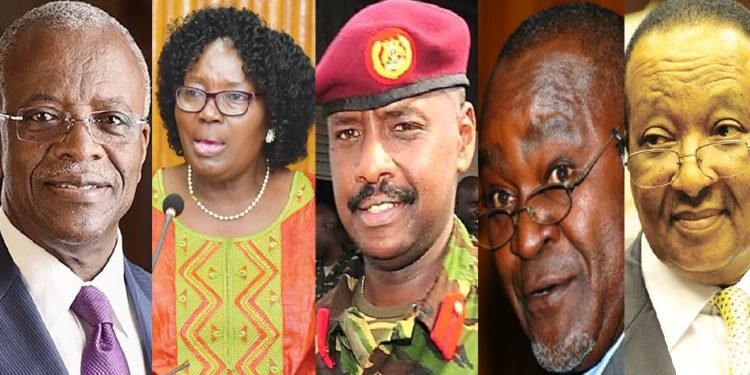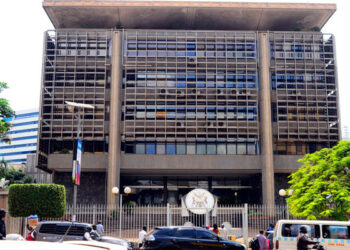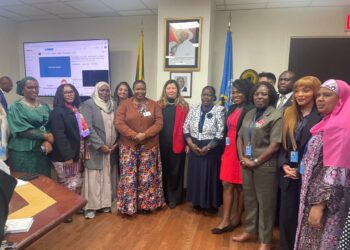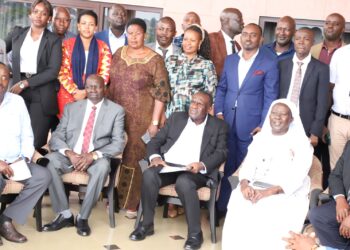Bobi Wine’s Monday announcement that he was withdrawing his presidential petition from Supreme Court meant the last hope alive of becoming Uganda’s President this year had died for good.
The post Museveni succession question has dominated Uganda’s political debates for decades ever since the President promised to return the country to civilian leadership shortly after capturing state power in 1986.
Now, 35 years down the road, the former National Resistance Army (LRA) leader is still at the helm of Uganda with his name set to carry on up to 2026.
Over the years, a number of names of prominent political leaders have been cited each time the succession question comes up. But what actually happened to them and where are they now? Below we try to answer that question;
1.Dr. SAMSON KISEKKA
He was the first Museveni Vice President in whom Buganda had higher hopes of bringing power back to the region which had been lost to Obote during the infamous Kabaka crisis of 1966. Kiseka had however slipped below the pecking order by the time he died in the early 1990s.
2.PROF APOLO NSIBAMBI
He was equally tipped for the biggest office of the land when he served as Prime Minister in Museveni’s cabinet. Besides his unshakable loyalty to Buganda Kingdom which made him a darling to Ugandans who believed in strong cultural institutions, his clean political track record and a vibrant academic background as a former University Professor had endeared him to both his tribesmen and the rest of Ugandans. He however died in 2019 after spending the last couple of his last days outside politics.
3. GILBERT BUKENYA BALIBASEKA
Gilbert Bukenya and John Patrick Amama Mbabazi who had served as Vice President and Prime Minister respectively in Museveni’s administration were perhaps the last experiments. However, they realised that trying to usurp power from the man from Rwakitura was the most complicated task humanly possible for anyone from within the ruling establishment.
Bukenya who had spent almost the whole of his tenure as VP trying to master how his master conducted himself had seemingly became certain beyond telling that the future beyond the horizons belonged to him with certainty. With partial success in his upland rice program upon which he had planned to popularise his future Presidential bid around the country, the madly ambitious man from Kakiri had reached an extent of believing that he was inseparable to the President. As such, the former Makerere Don started dressing, walking, talking and perhaps eating like Museveni.
At the peak of his uncontrollable appetite for the Presidency, Bukenya erred when he attempted to force his way onto the top. He wrongly believed that his four years as Museveni’s second in command was sufficient to make his claim at the Presidency a legitimate one before most Ugandans. Unfortunately, Bukenya’s beliefs were a complete political suicide which earned him nothing but some months in Luzira and a first class ticket into political Oblivion.
4. JOHN PATRICK AMAMA MBABAZI
Just like Bukenya, former Museveni bush war ally John Patrick Amama Mbabazi had a share of Museveni’s wrath when he attempted to claim what practically couldn’t ever be his. Unlike Bukenya whose association with Museveni had come in the early 1990s when he join politics in the Constituency Assembly, Mbabazi had been a Museveni confidant since the bush war days where he served as rebel outfit’s head of the political wing majorly charged with mobilising funding.
He however gradually fell out with Museveni from 2002, in a silent conflict that was reportedly linked with his Presidential aspirations. In 2012, a Kenyan news paper had reported that the then strong Premier had fallen out with his long time ally Gen Museveni although the government denied any bad blood between the two.
The differences however became public and escalated into Mbabazi’s sacking from both the NRM party leadership and the Cabinet where he was the Secretary General and Prime Minister respectively.
Resultantly, he responded by declaring his intentions to face off with his former employer in the 2016 general elections. Indeed Mbabazi was nominated and run against Museveni coming a distant third after Museveni and FDC’s col Kizza Besigye.
Even though most members in opposition mainly from FDC had rejected his candidature arguing that he could be a regime stooge to disrupt the forces of change, the regime’s iron hand against Mbabazi and his campaign Entourage thought the campaign period gave birth to more questions.
While on a rally at a playground in Fort Portal in November 2016, Lt Gen Henry Tumukunde disrupted the day’s business when he flew an army chopper at the venue, disrupting the campaigns that day. He later lamented that Tumukunde had received large sums of money to intimidate his mobilisers or buy them off.
He retired out of public life after disastrously losing the election to Museveni. His recent appearances with Museveni since last year and ignited some talk that the former super Minister could be warming up for a return to government although nothing tangible has so far come out of the rumours officially.
5. REBECCA KADAGA
She is arguably the second most influential politician in the country after Museveni himself. She boasts of a record of being one of the longest serving member of Parliament having been one ever since when Ugandans started voting for their MPs in 1996. She had however served as a Minister since 1989 before representing Kamuli District in the 1993 – 95 CA.
By next year,Kadaga will have been a Speaker/Deputy Speaker of Parliament for a record 20 years having deputised current VP Edward Kiwanuka Ssekandi from 2001 to 2011 when she officially took over from him after being appointed VP.
Her influence within Parliament and internationally as the first female to hold that office on the black man’s continent has resultantly brought her name in contention for the Presidency.
Her recent altercations with her party chairman over the Shs20 million gifted to each member of Parliament to help in the fight against Coronavirus back in their respective Constituencies had threatened to tear into threads their already delicate relationship, with many projecting an ugly fall out between the two a head of 2021.
With legal questions surrounding the possibility of postponing next year’s over the Coronavirus pandemic at the time, political analysts had argued that Museveni had tactically avoided declaring a state of emergency over his suspicions for the Speaker of Parliament who would in the event be entrusted with power should there have been no elections by June next year.
Ever since that public outburst with Museveni, rumours linking her to a possible Presidential bid have been popular mainly from her native Busoga.
6. Col Dr. WARREN KIZZA BESIGYE
Besigye’s relationship with the current leader dates back in the bush war days where he was his personal physician, saving his life on a number of occasions.
Following the capture of state power in 1986, Besigye went on to serve in various capacities until 1998 when he fell out with his bush war comrade as the regime political commissar.
Besigye challenged Museveni in 2001 and the result of the election was an eye opener to those silent dissenting voices that had come to conclude that Museveni was politically invincible. Besigye’s 2001 bid has been credited for giving birth to the current opposition against Museveni’s government.
Although 2001 was a tough environment for Besigye and his other anti regime allies, it had marked the beginning of a challenge that would see him rock horns with the regime for over twenty years. The challenge has been characterised by numerous arrests, detentions and trials before the courts of law, being names as arguably the most arrested Person in the world in the process.
Having grudgingly lost in the previous election which he has numerously claimed he won but was rigged outrightly, the best years for the country’s iron man seem to be behind him. Calls for him to step out of the struggle have been so loud especially in the last two years since the advent of Kyadondo East MP Robert Kyagulanyi Ssentamu aka Bobi Wine.
After a series of resistance statements insisting he wouldn’t be pushed to rally behind Kyagulanyi, Besigye seemed to have bulged when he announced an alliance with the firebrand people power leader less than a month before he declined calls from party members to give a another shot at the Presidency for a record fifth successive time.
Eventhough Besigye could not have been able to achieve the dream of ending Museveni’s rule in his two decade long endeavors, his efforts have certainly not been in vain. He is credited to having laid the foundation for a strong opposition whose results in future will have to bear his name as the father of the revolution.
7. Lt. Gen. MUHOOZI KAINERUGABA
Gen Muhoozi is a son to the current leader Gen.Museveni. He is currently a presidential advisor on special operations .
Gen Muhoozi Kainerugaba recently said his family’s relationship with the Bachwezi dynasty is the reason he and his father President Yoweri Museveni cannot be defeated by the opposition further proving his interest in the Presidency.
Museveni has been President since 1986 and his son Muhoozi has wifely been rumoured to be warming up to succeed him, especially since former spymaster Gen David Sejusa made claims that there was a dangerous plan to eliminate those opposed to a plot by Museveni to make his son his successor as head of state.
Recently, Muhoozi said his generation has turned what Gen Sejusa called the Muhoozi Project from a curse to a blessing and has been making political statements praising his father and also criticising his opponents, most especially People Power pressure group leader and Kyadondo East MP Robert Kyagulanyi aka Bobi Wine.
As if criticising his father’s opponents was not enough, Muhoozi has also claimed that the First Family’s Bachwezi ancestry makes them bold and undefeatable. He further claimed that his father Museveni and the last king of Nkore were “the last two ‘Bachwezi’ in history!”
He added that former President Milton Obote made a mistake to undermine Museveni and that he (Obote) “should have surrendered immediately” because “nobody on earth can defeat ‘Bachwezi”.
“I was privileged to have been loved and brought up by the last true ‘Muchwezi’ in Uganda. He was my uncle. He was called Fred Nkuranga Rubereza. He taught me that ‘It was a lovely life if lived with great courage and to die leaving an everlasting fame,” said Muhoozi.
Muhoozi’s alleged presidential aspirations have for the last few years been promoted by a group called ‘Friends of Muhoozi’ which includes events promoter Balaam Barugahara and some ministers in government. However, Museveni opted to have another term, meaning that Muhoozi will have to wait for another time.
The revelation above serves as an eye opener for both Mr Kyagulanyi and his other allies that the road ahead is rough and bumpy. As such, they should be aware that success can never be guaranteed unless effort is made to identify the reasons that caused failure for others before him so as to avoid a repeat their mistakes.
8.Dr. PAUL KAWANGA SSEMOGERERE
Having put a spirited challenge against Dr. Apollo Milton Obote in the the 1980 general elections that were controversially won by the later, Ssemogerere remained a popular name in the debate of who was most likely to be President after Museveni. President Museveni had in his inauguration speech promised to return the country into the hands of civilians through an election that would be organised shortly after 1986. Ssemwogerere became a significant presence in the Museveni administration, serving as Minister of Internal affairs, Foreign Affairs and Regional Cooperation and Deputy Prime Minister.
In 1995, Ssemogerere resigned from President Museveni’s cabinet as he prepared to contest as a presidential candidate in the elections that would take place the following year. In the elections of 1996, Ssemwogerere didn’t manage to replicate his impressive show of 16 years in 1980, garnering a mere 22.2% of the vote against Museveni’s 75%
Despite his 1996 dismal display, Ssemwogerere continued leading DP as it’s President General until 2005 when he handed over to John Ssebana Kizito who was the then Kampala City Mayor.
Do you have a story in your community or an opinion to share with us: Email us at editorial@watchdoguganda.com













